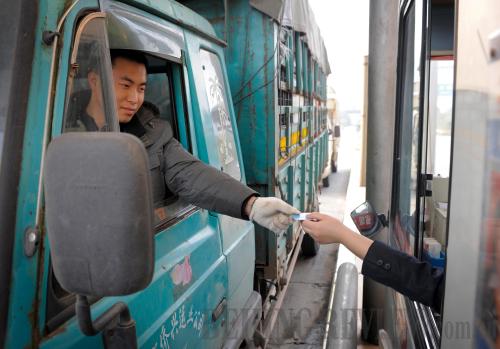|
 |
|
TOLL FREE: In southwest China's Sichuan Province, truck drivers delivering vegetables do not have to pay at the toll gates on the Chengdu-Nanchong Expressway (XINHUA) |
Good Deeds and Rewards
Two senior high school students in south China's city of Shenzhen have been praised and rewarded for their good deeds—helping an old lady who fell over, bloodying her face. The students were the only ones of many passers-by who helped the woman. They helped her up, took her to the hospital and paid her medical expenses before her family arrived at the hospital. Their school held an honor ceremony, awarding them each 800 yuan ($119). A foundation for justice and courage of the city also announced it would give them each 10,000 yuan ($1,493).
If these awards were given several years ago, it would have been thought to be a joke, but today no one finds it funny. To help a weak, elderly person up is such an ordinary thing, but why is it regarded as precious nowadays? Undoubtedly, the famous legal case in Nanjing, Jiangsu Province, where a young man who helped an old lady up from the ground had a bearing. The man was later ordered to compensate the old woman who claimed she had been pushed down by him, and the action has deterred most people from doing these kinds of good deeds.
The public is applauding the school and the foundation's action, but the Nanjing case warns people a good deed may also sometimes be risky. As a result, frightened people have refrained from doing good deeds.
The Shenzhen case is praiseworthy, but cash awards alone are unable to restore the impaired moral fabric here in China. What we need is the support of systems, especially the judicial system. Only when the judicial system gives people confidence they don't need to worry about the risks of doing good deeds will the whole of society be motivated to do them again.
Guangzhou Daily
Popularizing Science
China's top science and technology award for 2010 was conferred on Shi Changxu and Wang Zhenyi at the National Science and Technology Award Conference on January 14. The two scientists are from the Chinese Academy of Engineering and the Chinese Academy of Sciences.
The winning of this grand scientific award made the two academicians stars in the media. But most reports focused on the two winners, while little was mentioned about their research achievements. The media's choice is understandable. The public may find advanced scientific and technological topics difficult to understand, but stories about the scientists' lives are more interesting to read.
The public attention to this award reflects people's respect for and curiosity about science. The award can also be used as a good opportunity to popularize scientific knowledge among the public if the media use vivid and simple words to explain advanced scientific achievements.
When Stephen Hawking's scientific masterpiece The Grand Design has stirred up so much passion among the people, it's possible for China's scientific and publishing circles and the media to present meaningful and interesting scientific stories to ordinary readers to help improve the scientific knowledge of the whole nation.
People's Daily
Empty Promises
Complaints about the difficulty of buying train tickets for this year's Spring Festival transportation are surging as usual. Together with the complaints comes the Ministry of Railways' usual announcement tickets will be easier to get in several years. At a recent press conference on Spring Festival rail transport, Vice Minister of Railways Wang Guozhi said although tickets are now difficult to obtain, by 2015, getting tickets would have ceased to be a problem during the special travel season.
But for those who have waited for hours and even days outside ticket offices, this promise throws them into deeper despair, as similar remarks have been given out by the ministry year in year out.
The public is also clear it is unfair to complain the Ministry of Railways only, as it is an unrealistic expectation to hope the railway system can resolve the problem of a massive collective migration in a very short period.
But since this is the hard underlying difficulty, the railway department should just face it and tell people the truth. Instead of giving the public a promise hard to keep, the Ministry of Railways needs to do whatever can be done to help passengers have easier access to tickets, such as cracking down on ticket trafficking, providing more ordinary trains and fewer luxury trains and pushing forward with system reforms. When these problems are solved, the complaints will quieten down naturally.
Youth Times
Staggering Tolls Fraud
A man in Henan Province has been convicted of fraud and sentenced to life imprisonment for using fake military vehicle license plates to evade up to 3.68 million yuan ($549,000) in road tolls during 2,361 instances of travel over eight months. But recently, the local procuratorate said there had been many mistakes in the inspection and examination process and the case was therefore withdrawn.
The public was shocked by the excessively high amount of 3.68 million yuan in tolls. Details announced by the court showed this was indeed the correct amount.
Like much other basic infrastructure, roads are public facilities for the use of all of society, and not the private facilities of a small interest group. For whom are tolls collected? If, as it is claimed, tolls are from the people and for the people, they should be collected less. After all, drivers have already paid fuel surcharges. A research report by the World Bank reveals the proportion of tolls to per capita GDP in China reaches 2 percent, ranking top in the world.
The Ministry of Transport responded to questions on road tolls at a press conference on January 18, with measures aimed to straighten up the road toll collection system. The move of the ministry is good, but more detailed plans for the reform are needed.
Qianjiang Evening News | 